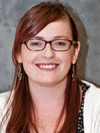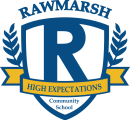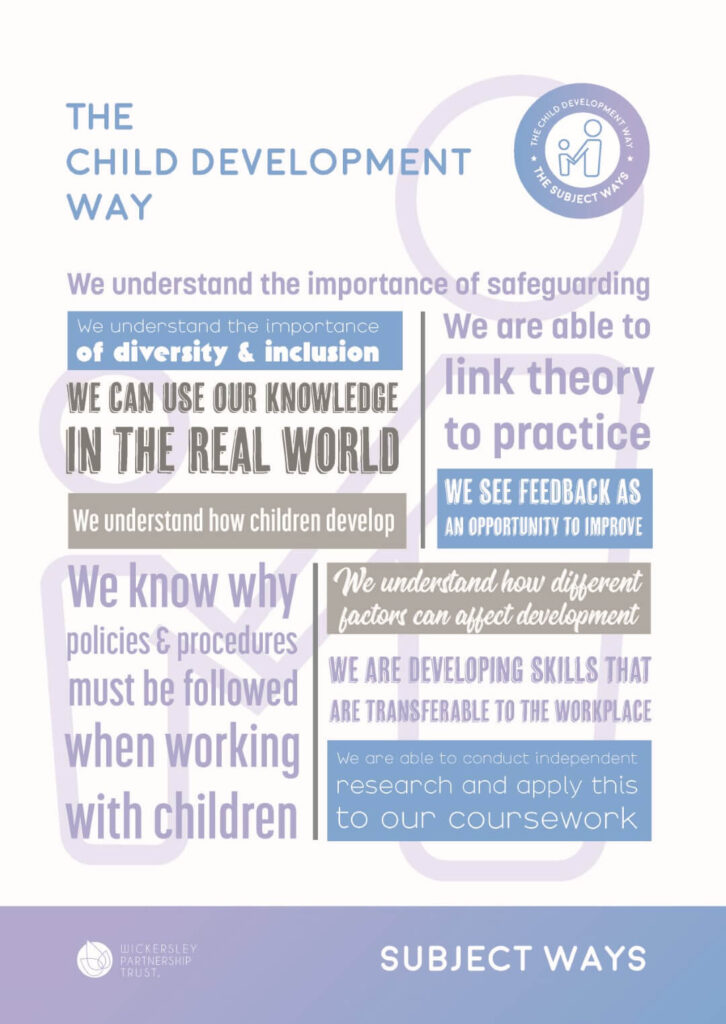Curriculum
Child Development

Mrs Mayfield
Head of Social Sciences
Subject Staff
Mrs Hawkridge
The Subject Way
Our subject has a ‘Subject Way’ at the heart of it. Our Subject Way is designed to help students become young subject specialists. The Subject Way has two main purposes:
- Firstly, to teach students the vital skills they need to achieve their full potential and gain the very best grades they can. Secondly, to teach students how each subject relates to the wider world, incorporating the life skills they will learn.
- It is our belief that knowing how what you learn links to the wider world brings a subject to life and therefore improves overall understanding and engagement.
Our Intent
At Rawmarsh Community School we aim to ensure our Child Development curriculum is designed to sequence learning and embed the key skills that are required to develop curious students into competent individuals with a sound knowledge base of Child Development and Care from pre-conception through to the age of 5.
Child Development is a broad subject that allows pupils with an interest in areas such as an understanding in how children develop, roles and careers within the child care sector, how pregnancy develops or even simply how to be a parent to explore and understand the skills and attributes that you need for this. Within the Child Development curriculum pupils will start at preconception with understanding the roles and responsibilities of parenthood right the way though to a child being 5 and starting at school. Knowledge gained in childcare would be of use for further studies in PHSE, Biology, and other social science qualifications.
How we intend to remove barriers
In Child Development we remove barriers to learning and support students’ ability to access the curriculum through the development of literacy through writing up coursework using real life scenarios and the use of targeting questions to help pupils write up their work. Literacy misconceptions do not go unchallenged and work is regularly checked for literacy errors allowing pupils to grow in confidence within literacy and access the skills required. Within Oracy pupils are given the opportunity to read widely through researching a variety of information that they can include in their coursework such as the government white paper guidance on the eatwell plate and develops pupils oracy and vocabulary skills through group work. Students will be given key vocabulary to support their learning and there will be reciprocal reading based around Child Development topics.
How we develop skills for learning
Throughout the Child Development curriculum students will develop creative skills by applying knowledge to different scenarios. Students will also be learn to recall information and apply them to different situations. As part of Child Development pupils will create and take part in creating and evaluating activities. Pupils are encouraged to practice divergent thinking when applying knowledge to different scenarios.
How we foster personal attributes
Aspects of the Rawmarsh Way are built into the Child Development curriculum. Students will develop independence skills by undertaking and completing assignments. Independence and Resilience skills will also be developed by students learning how to develop their ideas. Overall, students will be able to develop fundamental Child Development skills which will allow them to be responsible citizens in and out of Rawmarsh Community School.
How we intend to enrich student experiences and broaden the horizons of students
Childcare is a subject that naturally goes beyond the classroom. Students are given a range of opportunities to broaden their horizons in the Child Development curriculum. Students will get the opportunity to hear from real Early Years practitioners and other job roles who work with young children including midwives as part of the course to gain real life experiences. Students also will get practical experience through the use of demonstrations and practical activities. All students will also get the opportunity to visit a foundation stage classroom and work with children under 5.
A number of our students in the past have chosen to volunteer at various childcare providers and we work closely with the careers team within school to help students who want to find voluntary positions. A number or our students have also secured part time employment in vaiours childcare settings due to studying this course. Child Development is a popular subject to study at Level 3 with a number of our students leaving to study it at college level.
Our Curriculum
In Year 9 our students are introduced to the key topics and understanding in Child Development. They gain knowledge in pregnancy, parenting and developing skills to plan an activity suitable for a child. This year 9 curriculum acts as a foundation to support further study in childcare but also supports learning in other Key Stage 3 subjects such as Health and Social Care, PSHE and Science.
Students in Child Development develop key writing skills that will ensure they are ready for their next stage of learning such as being able to outline and identify key parts of the topics. They then learn how to describe using key vocabulary from childcare. A final key skill we look at is explaining and justifying topics. For example we explain and justify the importance of the different roles and responsibilities of parenthood.
The first topic of study – RO18 – underpins all of the other learning in this qualification. This is also the exam unit which takes place in Y11. Students will develop the essential knowledge and understanding in child development, covering reproduction, parental responsibility, antenatal care, birth, postnatal checks, postnatal provision, conditions for development, childhood illnesses and child safety. Knowledge gained would be of use for further studies in PHSE, Biology and other child development qualifications.
In year 10 we start completing the coursework elements of the course. In the first piece of coursework (R019) students will gain knowledge of the equipment needs of babies and young children and an understanding of the factors to be considered when choosing appropriate equipment to meet all of these needs. We apply this to a real life situation of working in a nursery. This piece of coursework will also cover nutrition including studying micro and macro-nutrients and the function these have within the body. We also look at nutrition requirements for children including breast/bottle feeding, stages of weaning and nutritional requirements of a child 1-5. Pupils are also given the opportunity to investigate feeding solutions, comparing these to nutritional requirements and evaluating the outcomes.
Students advance on the key writing skills that they learnt in year 9 applying them to writing up their coursework. Researching, planning, observing and evaluating skills are developed throughout their coursework. The skills learnt will be useful in further studies as these are transferable skills and could be applied to many subject areas. Due to the nature of the coursework element pupils also learn key life skills such as independence, time management skills and resilience.
In our second piece of coursework (R020) students will gain an understanding of the development norms from birth to five years focusing on Physical, Intellectual and Social development. We also look at the reasons why children may not meet these norms for example the impact autism has on the development of a child. The second part of this coursework is we investigate the stages and benefits of play which student then present. At the end of year 10 all pupils will take part in a project where they observe, plan and then run activity with a child under 5. They then evaluate their project to see if their activity was appropriate and successful. Student also continue with consolidating their knowledge from the RO18 exam unit ready to sit the exam.
By the end of Year 11 students should be able to identify part of the subject, describe the area they have outlined and finally explain/ justify the area. For example identify safety concerns in the home, describe the concern and explain the effects it may have on a child if they were injured. It is also expected that pupils will demonstrate childcare skills through their child project.
Department Staff
- hmayfield@rawmarsh.org
H Mayfield
A Hawkridge
Find out more
If you would like more information about our curriculum, please contact the school using the details on our contact page.
Our Subjects at KS4
CORE SUBJECTS
EBACC SUBJECTS
OPTION SUBJECTS



